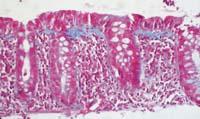Intestinal bacteria, pharmaceutical

A bacterium has been genetically modified to release a protein to cure colitis
Drugs that are administered verbally against colitis have a problem: often the active compounds become inactive before they reach their destination. To overcome this, microbiologists at the Food Research Institute of Great Britain have genetically modified an intestinal bacterium to generate and release the drug (a protein). And they have achieved good results.
It is not the first time they try it. For example, in 2000, at the Ghent University in Belgium, Lactococcus lactis was transformed to release 10 interleukin-proteins that cure colitis. But they were not able to control the production of proteins.
On this occasion, those of the Food Research Institute have transformed Bacteroide ovatus. It has been introduced in the DNA of the bacterium the gene of a protein essential to maintain the healthy intestinal membrane (2 growth factors of keratinocyte), and it has been affirmed that the bacterium only expresses it when it eats xilane, that is, that is when it produces the protein. This allows to control the production of proteins by dose of xilane.
In the mouse it has been proven that this protein stops intestinal bleeding and forms the membrane without side effects. It is believed that this system can also serve to release other drugs, so a dozen lines investigate, including one against cancer.
However, on the website of the journal Nature, in addition to reporting the news, is included the opinion of the doctor of the intestines Francisco Guarner of the hospital Vall d'Hebron of Barcelona. In his opinion, it is significant that since 2000 this path does not give good results, so he has taken with prudence the current research.





